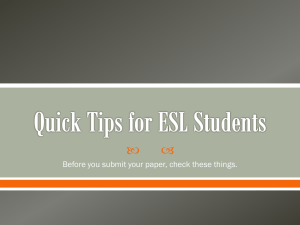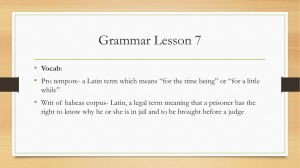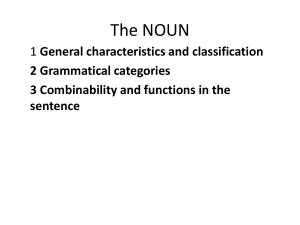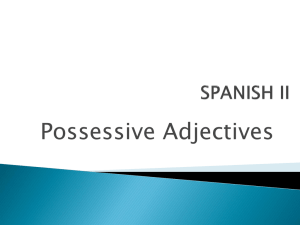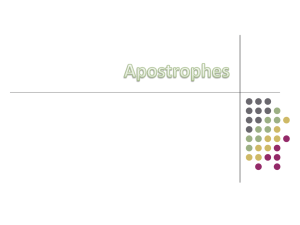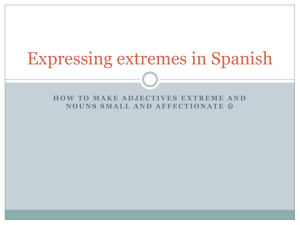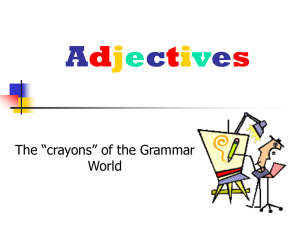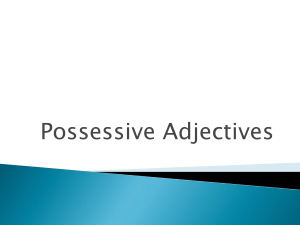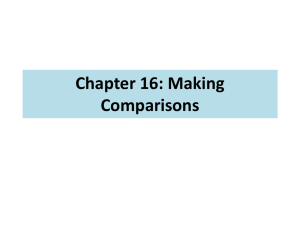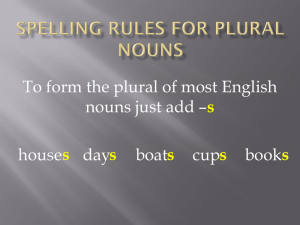Diapositiva 1
advertisement
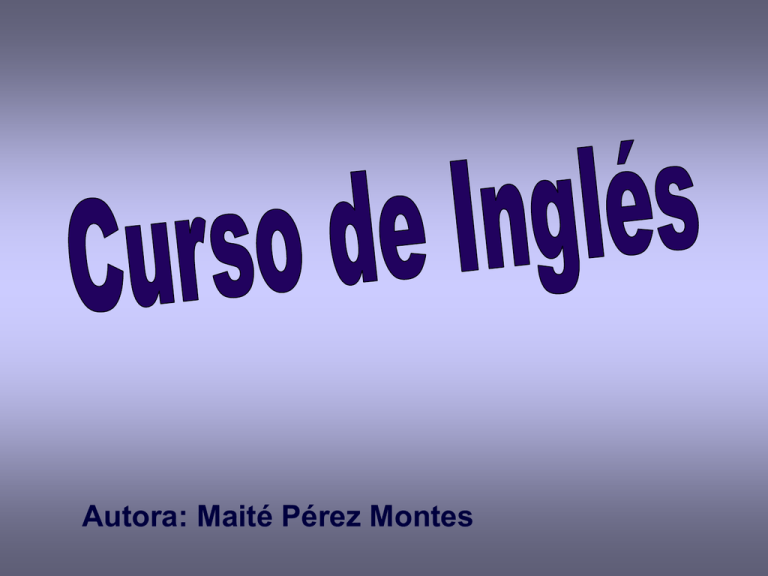
Autora: Maité Pérez Montes
Articles
• Definite Article
• Indefinite Article
• Exercises
Definite Article
•
The definite article is the and it is used for singular and plural. It is also used before
nouns that express the only one of its kind.
•
Examples:
•
the earth
the sky
the sun
the moon
the planet
It is used before a noun made definite by the addition of a phrase or clause.
•
•
•
•
•
Examples:
The girl who wears blue jeans.
The man who came with the rain.
I saw the English teacher.
The is used before a noun which, by reason of locality, can represent only one
particular thing.
•
•
•
•
•
Examples:
Ann is in the kitchen.
Please, give me the sugar.
The pizza in this restaurant is not good.
The is also used before superlative adjectives.
Indefinite Article
•
•
•
•
•
•
•
•
•
•
•
•
•
•
•
•
•
•
The indefinite articles are a or an. The form a is used before a word
beginning with a consonant or a vowel sounded like a consonant.
The form an is used before words beginning with a vowel or a mute h.
Examples:
a table a university an egg an hour
A is used before a countable singular noun and represents a particular
person or thing.
Examples:
I saw a woman.
A horse is an animal.
A dog can trap a mouse.
A is also used as a noun complement.
Examples:
She is a secretary.
She wrote a good book.
Henry is an excellent person.
A and an are used before certain numerical expressions and in expressions
of price, speed, ratio, etc.
Examples:
a dozen a hundred a ton
a day
an hour
two pounds a dollar
Exercises
•
Write the or …. when the can be omitted.
•
•
•
•
•
•
•
•
•
•
•
•
•
____ Sky is blue and ____ sun is shining.
I don't like to listen ____ news on ____ radio.
When they left ____ airport they went ____ home.
Cars are producing ____ pollution every day.
It's a nice restaurant and ____ food is delicious.
Children learn to speak ____ languages fast.
Earth rotates around ____ Sun.
He left ____ home early and went to ____ movies.
Tigers are protected in ____ Indian jungle.
____ envy is one of ____ worst human feelings.
____ shrimps at ____ Henry's restaurant are good.
She likes to watch ____ horror films on ____ TV.
____ Spacecrafts were invented in ____ 20th century.
Nouns
Definition and classification
Plural of nouns
Possessive case
Exercises
•
•
•
•
•
•
•
•
•
•
•
Definition and classification
A noun is the name of anything. They are classified in:
common nouns: nouns that are the names given to people, things or
places of the same kind.
Examples:
dog, man, bird, bridge, etc.
Proper nouns: nouns given to a particular person, thing or place. They
begin with capital letter.
Examples:
John, Paris, Germany, Amazon, etc.
Abstract nouns: nouns that name qualities or ideas that you can not touch
or see.
Examples:
love, speed, beauty, etc.
Plural of nouns
•
The plural of nouns are generally formed by adding s to the singular.
•
Examples:
•
•
car - cars pencil - pencils book - books boat – boats
Nouns ending in o, ss, sh, ch, or x form their plural by adding es.
•
•
•
Examples:
potato - potatoes
church - churches
kiss - kisses
fox – foxes
brush -brushes
•
Foreign or abbreviated words ending in o add s only.
•
•
•
Examples:
photo - photos piano - pianos dynamo – dynamos
Nouns ending in y preceded by a consonant form their plurals by changing
the y for an i and adding es.
Examples:
secretary - secretaries baby - babies
country - countries
•
•
•
•
•
•
•
•
•
•
•
•
•
Nouns ending in y preceded by a vowel form their plural by adding only s.
Examples:
toy - toys
play - plays
donkey - donkeys
Some nouns ending in f or fe form their plurals by changing the f or fe for
ves.
Examples:
wolf - wolves
knife - knives
thief - thieves
life – lives
There are nouns that form their plural by a vowel change.
Examples:
man - men woman - women foot – feet
tooth - teeth
child – children
Possessive case
•
The possessive case of singular nouns is formed by putting ('s) after the
noun that stands for the possessor. Singular nouns ending in s only add the
apostrophe ( ' ).
•
•
•
Examples:
John's wife St. Patrick's church
the boys' car
The possessive case of plural nouns is formed by placing an apostrophe (‘)
after the noun if the plural ends in s or by placing ('s) after the noun if the
noun does not end in s.
•
•
Examples:
the girls' books
ladies’ room
men's room
Exercises
•
Fill in the blanks with the plural for each noun.
•
•
•
•
•
•
•
•
•
flower _________
party
_________
woman _________
coat
_________
cabbage _________
match _________
scarf
_________
dress
_________
clay
_________
waitress _________
remedy _________
sheep
_________
booth
_________
foot
_________
loaf
_________
child
_________
mouse _________
corpse
_________
wolf
_______
bush
________
dispatch ________
memory _________
wife
_______
nucleus _________
Pronouns
•
•
•
•
•
•
•
•
•
Definition and Gender
Personal
Case
Indefinite
Demonstrative
Interrogative
Possessive
Relative
Exercises
Definition and Gender
•
•
•
•
•
•
•
•
Words that are used to substitute nouns in a sentence or paragraph are called Pronouns.
The English language has three different genders: masculine, feminine and neuter.
The pronouns he and him that are used to substitute male or masculine nouns have a
masculine gender.
The pronouns she and her that are used to substitute female or feminine nouns have a
feminine gender.
The pronoun it that is used to substitute things has a neuter gender.
The pronouns I, me, you, we and us can be either masculine or feminine while the
pronouns they and them can be masculine, feminine or Personal
Personal pronouns are those pronouns that stand for persons. If they are used to refer
only one person they have a singular number (I, me, he, she, him and her) but if they are
used to refer to more than one person they have a plural gender (we, us, they ,them).
Personal Pronouns
•
•
•
•
Singular
First Person
Second Person
Third Person
I
You
He, She, It
Plural
First Person
Second Person
Third Person
We
You
They
Case
•
•
•
Pronouns, according to the function they do in a sentence, are divided in:
subject pronouns (when they are the subject of a sentence) or
object pronouns (when they are the object of a verb or a preposition).
Subject
Pronouns
First Person
Second Person
Third Person
First Person
Second Person
Third Person
•
Singular
•
Plural
•
•
•
Examples:
I visited him.
He is tired of her.
I
You
He, She, It
We
You
They
Object
Pronouns
Me
You
Him, Her, Itç
Us
You
Them
Indefinite
•
•
•
•
•
•
•
These pronouns can refer to persons or things. The endings one or body
refer to people while the ending thing refer to things.
Indefinite pronouns with the suffix some are generally used in affirmative
sentences while those with the suffix any are used in negative and
interrogative sentences.
Indefinite pronouns with no are used in sentences with affirmative verbs.
Examples:
Somebody /Someone is knocking at the door.
I didn't talk to anyone/anybody in the park.
There was no one in the classroom.
Demonstrative
This
Singular
These
Plural
That
Those
•
This, that, these and those can be either a demonstrative adjective or a
demonstrative pronoun. If they substitute a noun in a sentence they are
pronouns, but if they modify a noun they are adjectives.
•
•
•
•
•
Examples:
This book is new. (Adjective)
This is a new book. (Pronoun)
These dictionaries are good. (Adjective)
These are good dictionaries. (Pronoun)
Interrogative
•
For persons
who
whom
whose
•
•
•
For things
what
•
These interrogative pronouns have the same form for singular and plural.
•
Examples:
•
•
•
Who did you meet?
What are you doing?
Which/Who is my eldest pupil?
For persons and things
which
Possessive
Personal
Pronouns
I
You
He
She
It
We
They
Possessive
Adjectives
my
your
his
her
its
our
their
Possessive
Pronoun
mine
your
his
hers
its
ours
theirs
•
Examples:
•
•
He teaches her son. (Possessive Adjective)
She teaches ours.
(Possessive Pronoun)
Relative
Nominative: who, that
Accusative: whom, who, that
Possessive: whose
•
For persons
•
Examples:
•
•
•
The man who saw you is my brother.
The book that he brought was new.
The girl whose car is new is her daughter.
(Nominative)
(Accusative)
(Possessive)
Nominative: which, that
Accusative: which, that
Possessive: whose, of which
•
For things
•
•
•
•
Examples:
The horse that won the contest.
The novel which he wrote.
The book whose cover is red.
(Nominative)
(Accusative)
(Possessive)
Exercise
•
Fill in the blank with the appropriate pronoun from the list below. Some of them could be repeated.
–
–
–
–
–
–
–
–
–
There were __________ books on sale in the shop.
__________ are the books Sarah brought yesterday night.
The manager _________ caught the thief in an office.
Jack recognized the man _________ stole the bank.
__________ of the students came with the new books.
It is dry because there was _________ rain this month.
__________ is the author of this mess in the kitchen?
He heard a voice but __________ was calling __________.
_________ gave ________ ________ in the park yesterday night.
(Liz)
(John)
(the keys)
– _________ are the professors _________ wrote the book.
– _________ didn’t want to buy ________ in the new shop?
(Rose)
– _________ the car ________ is parked behind the red ________?
– _________ is the house the Smith's built ___________.
– The sofa _________ cover is red and green is the oldest.
– There are nineteen students _________ don't bring so ________ money to buy the books.
– Mary bought some tea but Rose didn't buy __________.
– _________ is the owner of the new hotel in the beach?
– Ted brought ________ the shirt ________ he made ___________.
(I)
– Robert found a wallet in the library _________ is __________.
(Ann)
– Jane and Carl came together. _________ with a present.
•
List:
himself who each that these
some anybody a little
whose
him
she
them
anything
one
themselves
much
me
any
Adjectives
•
•
•
•
•
Definition and Classification
Comparison
One-syllable adjectives
Adjectives of two syllables
Adjectives of three or more syllables
Definition and Classification.
Words that go with nouns and tell us something about them are called
Adjectives. They have only one form which is used with singular, plural,
masculine and feminine nouns. They are usually placed before the nouns they
modify.
They are classified in different kinds:
Quality: round, bad, thin, clean, light, etc.
Size: big, small, little, long, wide, etc.
Age: young, old, new, etc.
Origin: Indian, Italian, Cuban, American, etc.
Type: medieval, tourist, seaside, cosmopolitan, etc.
Demonstrative: this, that, these, those.
Quantitative: some, many, any, much, few, etc.
Interrogative: what, which, who, whose, etc.
Comparison
Positive: dark, tall, useful.
Comparative: darker, taller, more useful
•
•
•
•
Degree of
Comparison
•
•
One-syllable adjectives
One-syllable adjectives form their comparative and superlative by adding er
or est to the positive degree.
•
Examples:
•
•
•
Positive
Superlative: darkest, tallest, most useful.
Comparative
tall
thin
Superlative
taller
thinner
tallest
thinnest
One-syllable adjectives
• One-syllable adjectives form their comparative and superlative by
adding er or est to the positive degree.
• Examples:
• Positive
tall
thin
Comparative
taller
thinner
Superlative
tallest
thinnest
Adjectives of two syllables
•
•
•
•
•
•
•
Adjectives of two syllables form the comparative and superlative following
one of the previous rules.
Adjectives ending in ful or re form the comparative and superlative with
moºe and most.
Adjectives ending in er, y or ly add er and est to form the comparative and
superlative.
Examples:
Positive
clever
careful
Comparative
cleverer
more careful
Superlative
cleverest
most careful
Adjectives of three or more syllables
•
Adjectives of three or more syllable form their comparative and superlative by adding more or
most to the positive degree.
•
Examples:
•
•
Positive
•
•
Adjectives of two syllables
Adjectives of two syllables form the comparative and superlative following one of the previous
rules.
Adjectives ending in ful or re form the comparative and superlative with more and most.
Adjectives ending in er, y or ly add er and est to form the comparative and superlative.
•
•
•
•
Comparative
important
convenient
Superlative
more important
more convenient
most important
most convenient
Examples:
•
Positive
•
•
clever
careful
Comparative
cleverer
more careful
Superlative
cleverest
most careful
Exercise
•
Fill in the blank with the appropriate comparative or superlative form
of the adjective in parentheses.
–
–
–
–
–
–
–
–
Robert is ______________ than Richard.
(old)
Your new table is ______________ than my old desk.
(thin)
This house is _______________ the one we had in San Francisco. (big)
My novel is _______________ the novel he wrote last year.
(bad)
Excelsior theater is _______________ the new theater.
(far)
This appliance is _______________ the one we had before.
(useful)
His bedroom is _______________ my parents bedroom.
(obscure)
The monster of this film is _______________the one we saw in Stars War.
(ugly)
– This Christmas he feels ______________ he felt last year.
(happy)
– This player is ___________________ the one they chose last year.
•
(valuable)
– The furniture in this shop is _________________ in the shop near home.
(expensive)
– Tom is _____________ in the Mathematics class.
(clever)
– John's lecture was _______________ Henry's.
(important)
Adverbs
• Formation
• Kinds
• Exercises
Formation
•
•
•
•
•
•
•
Some adverbs are formed by adding the suffix ly to an adjective.
Examples:
slow - slowly bad - badly clever – cleverly
Adjectives ending in ly have no adverb form.
Examples:
likely lonely friendly lovely lowly
There are some adverbs that have the same form as their
adjectives.
• Examples:
• high
late
low
near
far
hard
little
early
much
fast
Kinds
• Adverbs are divided into seven different kinds:
•
•
•
•
•
•
•
•
Manner
Place
Time
Adverbs
Frequency
Degree
Interrogative
Relative
Manner
• quickly, quietly, kindly,
silently, well, &c.
badly,
bravely, hard,
fast,
slowly,
• They are used to express how something happens or the way
someone does the action.
• They are usually located after the verb or after the direct object, if
there is one.
• They must never be placed between a verb and its direct object.
• Examples:
• She speaks English well.
• They arrived silently.
Place
•
Here, there, up, out, down, in, by, near, anywhere, somewhere, far, &c.
•
These adverbs, like the ones of manner, are usually placed after the verbs,
or after the direct object, if there is one. They tell where something or a
person is, or is going. If there is an adverb of manner too, the adverb of
place comes after it.
•
Examples:
•
•
They built the house there.
We couldn't go anywhere.
Time
•
•
•
•
•
•
•
•
Now, soon, yet, still, then, today, yesterday, &c.
These adverbs are placed either at the beginning or at the end of a clause
or a sentence and they tell us when an action is done.
Yet should be placed at the end of the sentence and still is placed before a
verb different than to be or after the verb to be.
Examples:
She came yesterday.
Then she went to work.
She hasn't finished yet.
She is still at work.
Frequency
• often, always, ever, never, usually, rarely, sometimes, seldom, once,
twice, &c.
• They are placed after the simple tenses of the verb To Be and
before the simple tenses of verbs different than the verb To Be.
• They are placed after the first auxiliary with verbal tenses that have
more than one verb.
• Adverbs of frequency are often placed before the auxiliary when
they are used in emphatic answers to questions.
• Examples:
• She is always late to class.
• The train rarely arrives on time.
• They have never been abroad.
Degree
Almost, nearly, quite, just, barely, hardly, too, scarcely, very, rather,
fairly, extremely, &c.
They can modify either an adjective or another adverb. These modifiers are
placed before the words they modify.
The underlined ones can also modify verbs. They are placed before the main
verb in simple tenses and after the auxiliary in tenses of more than one verb.
Examples:
The soup is too hot.
He knows her quite well.
Interrogative
• Why, what, when, where, how.
• They are generally used in questions to ask the reason, the time, the
place or the way an action is performed.
• Examples:
•
•
•
•
Why did he come so early?
When is he leaving?
Where do you study?
How long is this road?
Relative
• Why, when, where.
• They are generally used to substitute a preposition and the relative
pronoun which.
• Why
• Why replaces for which and it is used for reasons.
• Example:
• The reason for which he left = The reason why he left.
• When
• When replaces in/on which and it is used for time.
• Example:
• The day on which he comes = The day when he comes.
• Where
• Where replaces in which and it is used for place.
• Example:
• The truck in which he moved = The truck where he moved.
Exercises
•
Select the appropriate adverb from the list below. Some of them could
be repeated.
–
–
–
–
–
–
–
–
–
–
–
•
•
They did not go _____________ during their vacations in Rome.
They were playing ____________to win the game.
She was asking about the city ____________she went.
____________ is the author of this mess?
The new student is ____________ asking questions.
He could ____________ answer a question of the test.
He could ____________walk after the accident.
They will open the exhibition ____________.
Have you ___________ been to New York?
I would like to know ___________ he left the country.
She ___________ finished her new novel.
anywhere somewhere nowhere well bravely scarcely badly
poorly where why when who what always rather very silently
scarcely yet seldom soon hardly almost fairly clearly
still often ever never almost rarely
•
Put the words in the correct order to form a sentence.
•
•
•
•
•
•
•
•
questions carefully. answer must You the
away didn’t when fly He the know would parrot
along was fast narrow driving old He road the
the walked slowly The along teacher hall
The the police and thief caught arrived suddenly
were silently night They during the working
was won She when she the fifteen barely medal
deceive is quite l woman to fool that He
•
enough didn't to run the train They reach
Prepositions
•
•
•
•
•
Introduction
Position
Time
Time and Date
Exercises
Introduction
•
•
•
•
•
•
•
•
•
•
•
•
•
•
•
•
•
•
•
The main objective of this chapter is to study prepositions according to their use and
the position they have in a sentence.
Prepositions are some of the shortest words of the language, but sometimes the most
difficult to use. They are generally found with a noun or pronoun to make a phrase.
Prepositions are usually placed before their nouns or pronouns.
Examples:
For a month in London at sea
without food
to us
with him
When prepositions are used in defining relative clauses, with infinitives or with
interrogative pronouns they are often moved to the end of the sentence.
In defining relative clauses
Examples:
The girl to whom I gave the letter.
The girl I gave the letter to.
The park in which I played.
The park I played in.
With infinitives
Examples:
A classroom in which to teach.
A classroom to teach in.
A park in which to play.
A park to play in.
With interrogative pronouns
Examples:
To whom you are talking?
Who are you talking to?
With what did you open the door?
What did you open the door with?
Time
•
•
•
•
•
•
•
•
•
•
•
•
•
•
Till and until are used for time but when from is omitted only till can be
used.
Examples:
We studied from six to / until ten.
We studied English till nine.
From can be used for place or time while since can only be used for time.
Examples:
He ran from 6 to 7.30 a.m.
She traveled from Rio to Havana.
She has been traveling since Monday morning.
For is used for a period of time while since is used when there is a definite
point of time where the action begins and it continues to the time of
speaking.
Examples:
for six years
for a week
for a month
She has been waiting since he left.
During is used with known periods of time or periods previously defined. It
is followed by the name of the period or by the, this, that or those.
Time and Date
•
•
•
•
•
•
•
•
•
At is used when it refers to a specific time of the day or with a period of time
that doesn't cover only one day.
Examples:
At six o'clock
at noon
at night
at Christmas
On is used when it refers to a day only.
Examples:
on Monday
on July 23rd
on Christmas Day
In is used when it refers to a period of time.
Examples:
in August
in Summer
in the morning
in 1941
Place
• At is used with a small village, an address, a certain point as a
bridge, a cross-road or a bus stop.
• In is used with a country, a town, a forest or any enclosed place.
• There is a slight difference between at and in:
• At means inside, outside or beside the place while in means inside
only.
• Either at or in can be used with a building, an office, a public place,
a river or a sea.
• In is used for location as explained before while into is used to
indicate entrance with a verb of motion.
•
•
•
•
Examples:
They are in the kitchen.
They went into the bedroom.
She fell into the pool.
Exercises
•
Write the appropriate preposition in the blanks. Some prepositions
could be repeated.
A famous writer wrote a book title "His Life" but it was never published. One
day when he was traveling
Madrid
Barcelona his car
crashed another car
a bridge and fell
the river. A passer-by
who saw the accident save the author's life because the writer didn't know
how
swim. As a prove
his gratitude he invited the
man
dinner
_____his home, and as he knew he owned his
life
the passer-by, he gave him a copy
his book _____ pay
his life
"His Life".
•
Write in each sentence the appropriate preposition from the
list below. Some prepositions could be repeated.
–
–
–
–
–
–
–
–
–
–
–
–
They studied hard ______7 p.m. ______ midnight.
My cousins came to stay _____________ telling me.
They have been living in Portland ___________ ten years.
He traveled ______train ______Ottawa _______North Carolina.
She visited her parents __________ her vacations.
The ax flew ________ his hand and fell _________ the river.
The thief entered _________ the broken window.
Paul sang a new son ________ the evening concert.
The noise _______ the motor was heard all _________the house.
She studied English with him __________ Christmas.
They waited ______ me ______ I returned.
She was studying ______ home _______ he came.
